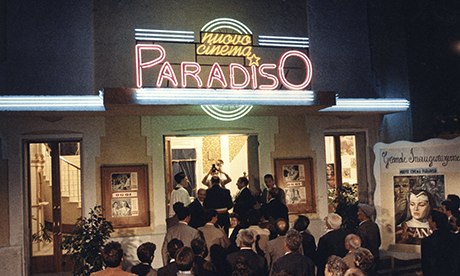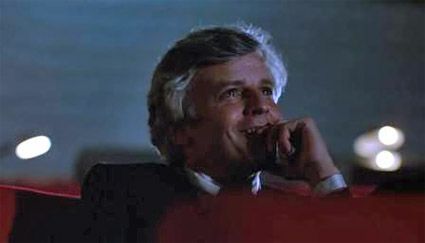Cinema Paradiso: A Classic that deserves to be remembered

When I was an innocent child, my first experience of watching a movie in the cinema was breathtaking. I had never thought that screens can be that big. When I asked my father how did they make big screens, he laughed and tried to explain to me that there's a projector at a room on top behind the audience projecting the film onto the screen.
In case you're curious, the first film I've seen on cinemas is in fact Finding Nemo.

After that experience, I was fascinated by the place of entertainment that is the cinema, just like Salvatore Di Vita, the protagonist of the 1988 Oscar winning film Cinema Paradiso.
Cinema Paradiso is an Italian drama film written and directed by Giuseppe Tornatore. The film explores the back story of the protagonist Salvatore Di Vita, a famous Italian film director; and his relationship with his mentor/father figure, a projectionist by the name of Alfredo. The story traces back Salvatore's life back when he was a six year old child, which revealed his passion for films through his constant ventures to the movie house in town Cinema Paradiso, which is also where he met Alfredo, the projectionist who worked there.

Initially, Alfredo didn't want anything to do with the child, so he promised to give Salvatore the cut up sequences (which consists of kissing or romantic scenes the town priest insists on censoring) if he never return, yet Salvatore returned anyway. Eventually Alfredo gave in and taught Salvatore how to operate a film projector. After an unfortunate film reel explosion incident that had burned the cinema and rendered Alfredo blind; Salvatore, despite being a child, was hired as projectionist for the newly opened and renovated Cinema Paradiso, for he is the only one in town who knew how to operate the machine besides Alfredo.
We continue to see Salvatore's development from an intelligent yet mischievous child to a mature and passionate adult. While his passion for film-making had grown over years of working together in Cinema Paradiso, his friendship with Alfredo had also strengthened. There's even an arc where Salvatore in his teenager years was attracted by the beautiful Elena, a daughter of a wealthy banker.

Wanting to win the heart of his potential love interest, he asked Alfredo for advice and help, which Alfredo provided. Alfredo even helped him get his chance into confessing his love for Elena, which Elena initially refuses. However, Salvatore didn't give up, and vowed to come visit her house every night until she reciprocates his love. Due to his commitment and possibly the reciprocal liking (the psychological tendency of people to reciprocate feelings of attraction to those attracted to them) taking effect, Salvatore finally won Elena's heart, and they had several romantic moments together....until Elena's father found out about the relationship and tore it apart by taking Elena abroad for education purposes. These poor unfortunate lovers in the end never got the chance to reunite.
After Salvatore's heartbreak, he left his hometown for compulsory military service. Upon returning, Cinema Paradiso had closed down, and Alfredo advised Salvatore to leave his hometown to Rome, for his hometown is too small for him to pursuit his dreams and passion of film-making. Before Salvatore left, Alfredo's final advice for him was to pursuit his dreams wholeheartedly and never return to his hometown, or even contact or remember the people of his hometown, for his homesickness would make him falter on his commitment of his passion, and become his undoing.

After years, Salvatore had succeed in his goal, and had became a famous film director. He eventually did return to his hometown to visit after hearing the devastating news that is Alfredo's death. He attended Alfredo's funeral, and watch as the extremely ancient and rundown Cinema Paradiso get demolished to build a public parking lot. This scene, while saddening, showed how impermanent is everything in our lives, even those that holds a great significance.
Before:

After:

Salvatore later returned to Rome, holding Alfredo's final gift for him which he received from Alfredo's widow after the funeral. It was a film reel, which when played was a compilation of all the romantic scenes from the movies Alfredo played when he was a projectionist, cut up for censoring purposes. This is the very thing Alfredo offered Salvatore in the beginning of the film if Salvatore promises to leave the cinema and never return. The symbolism here is perfect. In the future, Salvatore, urged by his mentor to leave his hometown and never return, returned anyway, just like he did in the past. But this time, he acquired the gift. The movie ends with Salvatore watching the film playing, choking back tears of emotion.


Overall, I can see why this movie got the awards it deserved. While the film's quality is not on a par with the films made today, it's a beautiful narrative that shows how films are played in cinemas in the distant past, and provides the message of how commitment is always important in pursuing your dreams. Be it pursuing your potential significant other or your careers or passion, one must never look back and never give up, especially in the most critical moment.
Only critique I can give is that his romance arc never got a satisfying closure. It was implied that Salvatore in his adulthood had been through several different relationships, where none of the girls truly loved him. While it's unsatisfying, it does show how you can't have anything you want in life, and emphasized the importance of finding someone who truly loves you.
If you like bittersweet, classic films with deep meanings, messages and symbolism, this is the film for you!
Turn on the subtitles, though. It's all in Italian. Unless you understand Italian or are learning Italian of course.
Thanks for the sharing. I wish I am a good father too took part of my son journey.
ReplyDelete